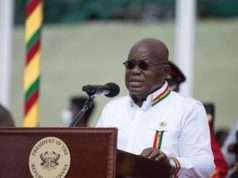The Joint UNited Nations Programme on HIV/AIDS (UNAIDS) in partnership with the Ghana AIDS Commission, the President of Ghana, and other relevant stakeholders recently launched the 95-95-95 Targets on World AIDS Day.
This programme was launched at the 2021 WORLD AIDS DAY NATIONAL DURBAR held in Accra. This is in line with the theme for this year’s World AIDS Day “End inequalities. End AIDS. It is hoped that the aim of the End AIDS targets will be achieved by the year 2030.
As the keynote speaker of the event, the President of Ghana, Nana Addo Danquah Akufo-Addo, who joined by digital means said
“We must continue to use the technical guidance proffered by the World Health Organisation, UNAIDS, and Center for Disease Control and Prevention to deliver effective testing, prevention and treatment services. Ending AIDS and achieving epidemic control are the goals of the National HIV/AIDS Strategic Plan 2021-2025”.
UNAIDS 95-95-95 targets is a programme which seeks to have 95% of people with the Human Immune Virus (HIV) get diagnosed, to get 95% of those diagnosed to be placed on antiretroviral drugs, and 95% of the diagnosed to be placed on viral suppression therapy.
The US Ambassador to Ghana, Stephanie Sullivan shared her solidarity message during the durbar and assured of her support for the programme, as she said,
“We wholeheartedly support the UNAIDS 95-95-95 targets, meaning that by 2030, 95% of people living with HIV will know their status, 95% of people diagnosed will receive sustained antiretroviral therapy, and 95% of all people receiving this therapy will have viral suppression. By meeting these goals, we can break the cycle of transmission”, said the US Ambassador to Ghana.
As part of the programme to increase testing and provide medication for the HIV patients, another goal is to reduce the transmission of the virus from mothers to their children during pregnancy.
Dr. Francis Kasolo, the WHO Representative to Ghana made this indication during her solidarity speech, when she said that
“Maternal to Child transmission remains a major challenge in Ghana. For example, in 2020, out of the estimated 17,694 pregnant women living with HIV, 3,683 children (21%) were born with HIV in the country. This number is unacceptably high given that we have highly efficacious medicines available in the country”.
Many organisations and leaders around the world understand how COVID-19 has affected the HIV services over the past two years. Interventions were slowed down, especially during the peak of the pandemic making lives for people living with HIV quite challenging.
However, the WHO representative to Ghana is hopeful that Ghana will make tremendous progress within the next few years in the efforts to eliminate Mother to Child transmission for it to receive certification in that regard in order to accelerate progress toward the 2030 end AIDS targets.
She added, “I am hopeful that within the next two years Ghana will be certified by WHO as being on the path to elimination of Mother and Child transmission”.
The Ghana AIDS Commission has indicated that Ghana has a generalised HIV epidemic with relatively low prevalence. This is characterised by pockets of high prevalence in some geographical areas and in sub-populations.
Even though there are targeted hopes of ending HIV/AIDS in 2030, Mr. Kyereme Atuahene, the Director General of the Ghana AIDS Commission agrees with Dr. Maria De Jesus that more time will be needed to end AIDS and that HIV/AIDS go beyond the intake of drugs and treatment services. He said “Ending AIDS requires a holistic development approach and a shared responsibility. This is because poverty and social inequity are some of the main drivers of HIV/AIDS.








































